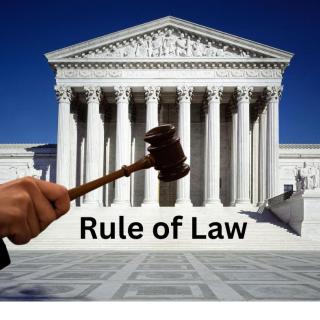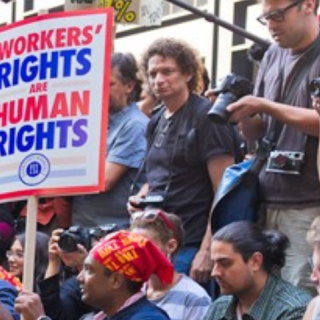Many Americans believe that the ongoing genocide in Gaza, the United States’ illegal bombing of Iran, and the United States’ disastrous proxy war with Russia in Ukraine are too far away to do anything about. These Americans, however, overlook the fact that most of the weapons and other military technologies used by Israel to massacre Palestinians, to commit war crimes against Iran, and to waste Ukrainian lives in a completely avoidable war are manufactured in their backyards. Americans do not need to travel to Gaza, Iran, or Ukraine to save innocent lives in those countries, they could interfere with the manufacture of weapons and other military technologies right here in the United States. On February 7, 2025, for example, the State Department approved a $6.75 billion sale of thousands of bombs and bomb guidance systems to Israel and reported that the sale will come “from principal contractors The Boeing Company, located in St. Louis, MO; ATK Tactical Systems Company LLC, located in Rocket Center, WV; L3Harris Fuzing and Ordnance Systems, located in Cincinnati, OH; and McAlester Army Ammunition Plant, located in McAlester, OK.”
Unfortunately, American law makes it virtually impossible for local communities – who are harmed by weapons and military technologies manufacturing and who also want to stand in solidarity with victims of the American war machine to legally interfere with local weapons and military technologies manufacturers. Let’s say, for example, that a corporation like Lockheed Martin or RTX (formerly Raytheon Technologies) has applied for permits to build a plant for manufacturing AGM-114 Hellfire air-to-surface missiles (commonly used by Israel) within a town’s city limits. The residents of that town learn about the public health and environmental risks associated with the missile manufacturing plant, learn that missiles will be used to commit genocide, and, therefore, oppose the plant’s construction. What legal options do these people have to stop the missile manufacturing plant?
If these residents go to their city government and propose passing a law banning missile manufacturing plants within city limits, the city attorney will introduce them to a legal doctrine known as “Dillon’s Rule,” which holds that a local government may exercise only those powers that their state government grants them. Or inform them of a federal or state law giving the federal or state government sole control and legal authority over missile manufacturing and preempting the town from passing any laws on the topic. Therefore, because the missile manufacturing plant is legal under state and federal law, city laws banning the plant are preempted and, therefore, illegal.
These issues are not theoretical; they are playing out right now across the United States. Threatened by two war technologies manufacturing plants – Intel’s Ohio One plant and Anduril Industries’ Arsenal-1 – as well as fracking projects, on May 15, Columbus, Ohio residents submitted a proposed city charter amendment initiative petition to their city government. The initiative is titled “To Protect the Local Self-Governing Rights of the People of Columbus from Preemption.” If residents gather enough signatures, the petition will be placed on the November 2027 ballot and Columbus voters will be asked to reject state and federal preemption and reaffirm the right to make decisions locally. Specifically, the proposed bill would make it so “local laws…shall not be subject to preemption or nullification by international law, federal law, or state law…” In other words, it would give the City of Columbus the power to ban destructive corporate projects like missile and other war technologies manufacturing plants.
Dillon’s Rule and preemption don’t just protect the military industrial complex, they also protect a host of extractive industries from local communities who do not want to be exposed to the dangers posed by those industries. The State of Ohio has preempted a staggering number of issues. For example, it has preempted local minimum wage laws, making it illegal for municipal governments to set a minimum wage higher than the statewide minimum wage currently set at $10.70 per hour; it has preempted cities from taxing or banning single-use plastic bags; it has preempted municipalities from enacting stricter gun control policies; and it has preempted local governments from regulating oil and gas activities like fracking. Overturning Dillon’s Rule and undoing preemption would make it more difficult for the American Empire to force destructive industries on to local communities.
Before readers get too excited, the reality under current law is that the Columbus city charter amendment is unconstitutional because only the state legislature can overturn nearly a century of Ohio precedent enshrining Dillon’s Rule in order to undo the doctrine of preemption. If the Columbus city charter amendment is passed, it will almost certainly be challenged immediately by corporations that benefit from preemption in court. And, like the Lake Erie Bill of Rights passed in Toledo, Ohio, the Columbus amendment will most likely be struck down by the courts.
So, why would residents push this Columbus city charter amendment if it is incapable of changing Ohio law? Columbus residents recognize that the only legal avenue for undoing Ohio’s doctrine of preemption is either by convincing a state legislator to propose a bill specifically outlawing preemption in Ohio and then to convince enough state legislators to vote to enact the bill. Or, by the people passing a state constitutional amendment by initiative. Straightforward enough, right? Not exactly. The problem is that Ohio legislators depend on corporate funding and support to remain in office. Meanwhile, getting a constitutional amendment on the ballot and passed takes millions of dollars and mass participation of the people. Eliminating the doctrine of preemption would make it very difficult for the world’s most powerful corporations to operate in Ohio. Those corporations will fight tooth and nail against efforts to curb their power. In reality, a mass movement by grassroots Ohioans that pressures state legislators to change the doctrine of preemption is required. Before that mass movement can form, though, Ohioans need to understand what preemption is and how it undermines their ability to protect their own communities. The public conflict that the Columbus anti-preemption city charter amendment will create between grassroots Ohioans and corporate interests will educate Ohioans about preemption and why it must go. As more and more Ohioans become aware of the problem of preemption, a mass movement pressuring the Ohio legislature can be organized.
It is important to keep in mind that there are also illegal ways to interfere with American weapons and war technologies manufacturing. Weapons and war technologies manufacturers could be sabotaged or shut down by large numbers of people blocking access to manufacturing sites. Major transportation routes from manufacturing sites to the sea and airports where arms are transported from could similarly be sabotaged or shut down by large numbers of people. Transportation and weapons manufacturing workers could strike.
A survey conducted by Data for Progress in January showed that nearly 4 in 5 voters – of any party – supported a ceasefire in Gaza. Imagine if even half of those voters were willing to show up and peacefully shut down major weapons transportation routes in the United States to cut off the weapons Israel depends on to massacre Palestinians. Workers in Europe have successfully used tactics like these. On June 4, in response to the unfolding genocide in Gaza, dock workers with the French union the General Confederation of Labour refused to load arms components bound for Israel from France’s largest port in Fos-Marseille. In Genoa, Italian dock workers committed to inspect the same vessel and block the vessel if arms were found. In October 2024, dock workers at Greece’s Port of Piraeus stopped a shipment of ammunition to Israel. And, earlier this year, the Swedish Dockworkers Union staged a six-day boycott of handling all military cargo destined for Israel. These same kinds of tactics will be necessary to pressure American governments like the State of Ohio to overturn Dillon’s Rule and undo the doctrine of preemption.
There is no question that Americans have an obligation to stop their government from enabling genocide and committing war crimes. The only question for each American is what kind of action he or she will take. For their part, the folks in Columbus, Ohio with their anti-preemption city charter amendment, are attacking the structure of American law which protects the American war machine, the destruction of nature for the production of profit, and enslaves people through low wages. This is a good action to take. However, Americans must not ignore the power they have to more directly confront American corporations that threaten communities here and around the world – companies that run private prisons or create technological means of surveillance or that despoil the environment from gas and oil drilling or mining in their own backyards. It’s just not true that there’s nothing Americans can do. Direct action groups working together with groups like the folks pushing the Columbus anti-preemption city charter amendment could stop the harm while also transforming the structure of American law. Stopping the harm while transforming the structure of American law are both necessary to protect against atrocities in the future.
For more information or to volunteer to help with the Columbus effort check out their website.
For more information on preemption or help outside the Columbus area contact CELDF.
--------------------------------
Will is a writer, lawyer, and environmental activist. The natural world speaks and Will’s work is how he listens. He believes the ongoing destruction of the natural world is the most pressing issue confronting us today. For Will, writing is a tool to be used in resistance. Will graduated from the University of Wisconsin-Madison Law School and practiced as a public defender in Kenosha, WI. He left the public defender office to pursue frontline environmental activism. So far, activism has taken him to the Unist’ot’en Camp – an indigenous cultural center and pipeline blockade on unceded Wet’suwet’en territory in so-called British Columbia, Canada, to a construction blockade on Mauna Kea in Hawai’i, to endangered pinyon-juniper forests in the Great Basin, and to Thacker Pass in northern Nevada where Will is trying to stop an open pit lithium mine from destroying a beautiful mountain pass. Will’s first book How Dams Fall describes his relationship with the Colorado River in the context of the first-ever American federal lawsuit seeking rights for a major ecosystem, that he helped to file, was published in August 2019. His second book When I Set the Sweetgrass Down, a full-length collection of poetry was published in 2023. You can follow Will’s work at willfalk.org. Contact: WillFalk@celdf.org



